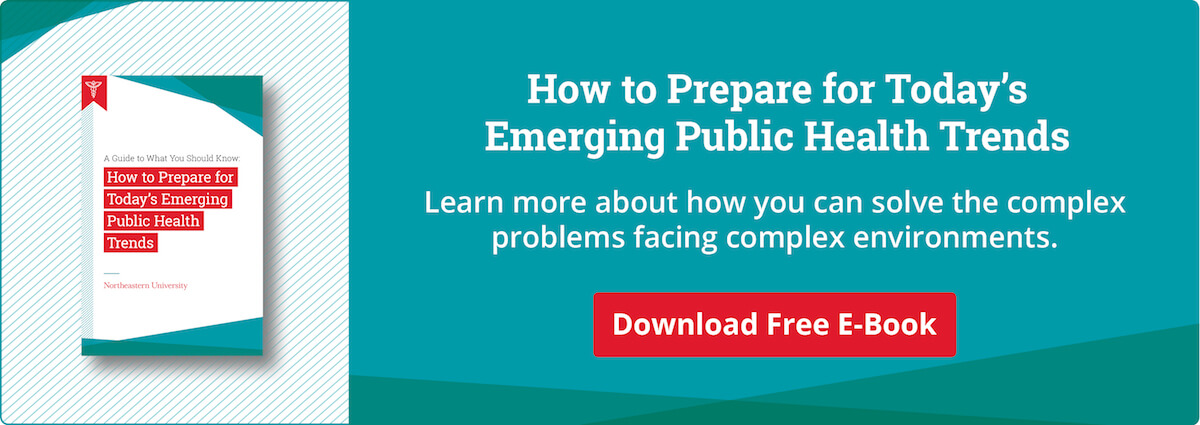When disease outbreaks occur, epidemiologists investigate the source. When communities are disproportionately burdened by chronic disease, epidemiologists investigate its determinants. These scientists are public health professionals who study patterns and causes of disease in populations.
These scientists work to understand the disease at hand, the risks associated with it, the distribution of the disease in and across communities, and groups of people most affected. They do this using a toolkit of various quantitative methods and well-designed studies. The results of their work are published in news articles and academic journals and inform community interventions and policies.
“In epidemiology, the goal is to produce a body of evidence that advances our understanding of what is causing health and disease in specific populations, and to make recommendations regarding interventions to improve public health,” says Collette Ncube, DrPH, assistant professor in the Department of Health Sciences within Northeastern’s Bouvé College of Health Sciences, and a faculty scholar at the Institute for Health Equity and Social Justice Research.
What Does a Public Health Epidemiologist Do?
Epidemiologists have the opportunity to tailor their careers to fit their specific interests in the field. However, in general, most epidemiologists are responsible for:
- Designing and managing studies of public health problems
- Collecting and analyzing data to find the causes of diseases or other health problems
- Communicating findings to health practitioners, policymakers, and the public
- Examining the effectiveness of public health programs and interventions
- Supervising professional, technical, and clerical personnel
“When you study epidemiology, you’re acquiring a set of skills that you can apply to the study of various health outcomes depending on your interests,” Ncube says. “Some of the sub-specialties might require additional training but the methodological skills are transferable.”
Download Our Free Guide to Preparing for a Career in Public Health
Learn more about how you can solve the complex problems facing complex environments.
Some sub-specialties epidemiologists might specialize in include:
- Cardiovascular Disease Epidemiology: The study of cardiac diseases, vascular diseases, and stroke patterns, and how to better diagnose, identify risk factors, prevent, and treat cardiovascular diseases through population studies.
- Field Epidemiology: The study of communities experiencing severe public health crises, such as an outbreak of foodborne illness or a pandemic.
- Infectious Disease Epidemiology: The population-based study of infectious diseases, including sexually transmitted diseases, HIV, diarrheal pathogens, and tuberculosis. These scientists also perform research related to vaccines and vaccine efficacy.
- Molecular Epidemiology: The study of how cells, proteins, and genes interact in order to find the root cause of disease and identify strategies that could prevent their transmission.
- Perinatal Epidemiology: The study of outcomes around pregnancy, including conception, infertility, hormone supplementation, reproductive cancers, pregnancy complications, infections, and birth defects.
- Pharmaceutical Epidemiology: The study of how a drug affects a population over time, including how conditions spread, who they affect, and which treatments have measurable impacts.
Public Health Epidemiology Career Outlook
Today is an opportune time to consider a career in epidemiology. The field is experiencing the spotlight as epidemiologists work alongside other scientists to better understand the Covid-19 pandemic.
In addition, epidemiological and public health capacity—which is the ability of state and local agencies to provide public health services and respond to emergencies—has increased dramatically over the past decade, according to the Bureau of Labor Statistics.
Epidemiological and infection control capacity is also expected to increase as more hospitals realize the benefits of strengthened infection control programs. Given the positive career outlook for these skilled professionals, experienced epidemiologists can expect a median annual salary of $70,990 per year.
What Skills Do You Need to be an Epidemiologist?
Epidemiology is a quantitative discipline and, as such, professionals in this field must be skilled in a variety of research methods. This includes understanding how to develop hypotheses, design studies, calculate measures of disease risk, and identify and address sources of biases, Ncube says.
Epidemiologists need strong math skills in order to perform various calculations, and programming skills to be able to run statistical models.
Communication skills are also key for these professionals. Epidemiologists must prepare and write reports based on the findings from the studies, and be able to effectively communicate them and their recommendations to other health professionals, policymakers, and the community.
For example, Ncube explains that “if an epidemiologist was tasked with finding out the burden of Covid-19 in a given population, they would have to consider how they’ll get a reliable estimate. How many, and what types of, individuals would you need to get a representative estimate? If you are estimating the burden of disease based on people that are coming into a particular hospital, how might those people different from the general population to whom you want to generalize? You need to think critically about how to get at a reliable estimate of what it is you’re trying to calculate, design an appropriate study, then be able to calculate the percentages or ratios required, with the least amount of bias.”
Prepare for a Career in Public Health Epidemiology
Nearly all industries that hire epidemiologists—academia, not-for-profit, and government among them—require that candidates have at least a master’s degree in public health or a related field, Ncube says. Other advanced positions require a doctorate.
Northeastern University’s Master’s in Public Health program prepares professionals for a successful career in epidemiology through experiential learning and exposure to industry-leading faculty in a supportive and engaging learning environment rooted in the social determinants of health.
Graduates with an MPH degree are employed in a number of varied professional settings including federal, state, and local health agencies; universities and colleges; hospitals; ambulatory medical centers; nonprofit organizations; community-based agencies; insurance and pharmaceutical industries; health maintenance organizations; and private foundations.
“Northeastern has a really strong program that is focused on preparing students for a variety of careers in public health, including epidemiology,” Ncube says.
If you’re interested in becoming an epidemiologist, earning your Master of Public Health is the first step. Visit Northeastern’s program page to learn more about how an MPH can advance your career.







Related Articles
4 Pressing Global Health Problems We Face Today
Global Health Careers: How Can I Make a Difference?
Compliance Specialists: Who They Are and What They Earn